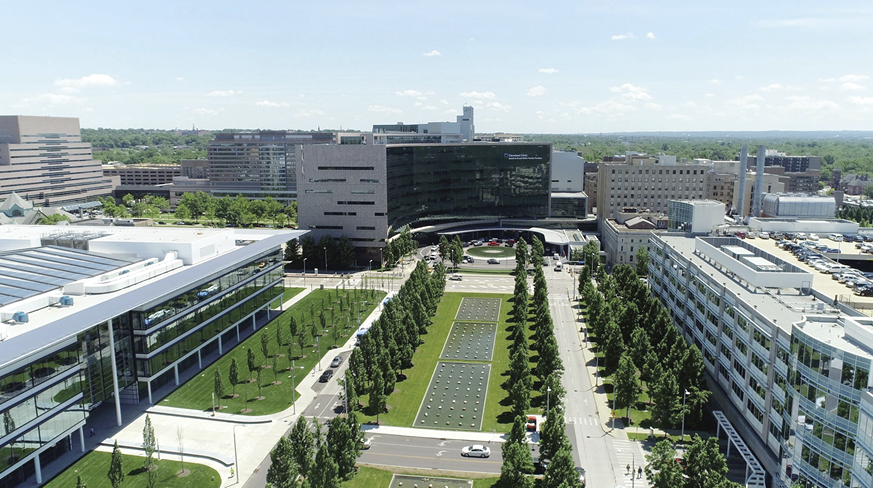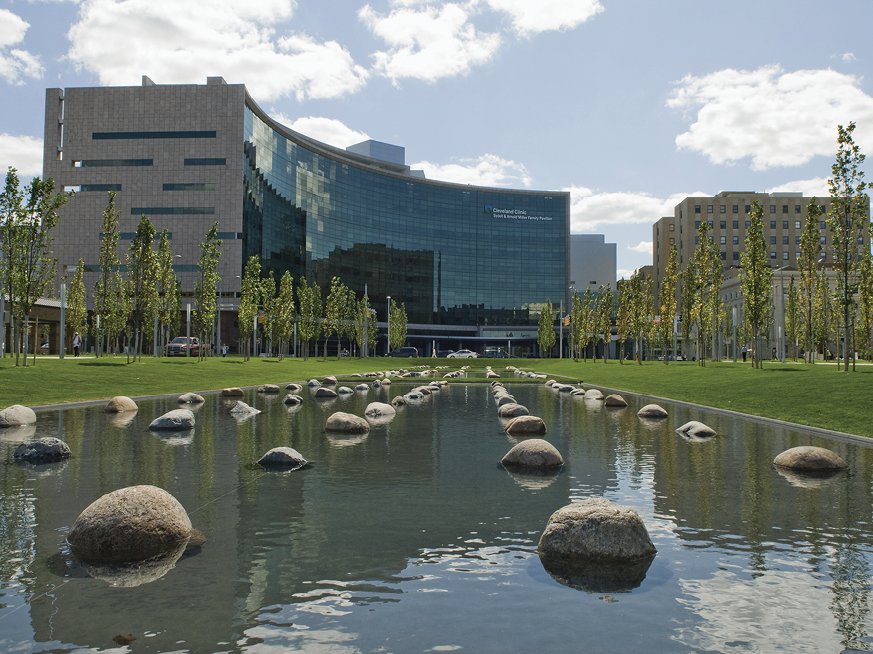- Home
- Media Kit
- MediaJet
- Current Issue
- Past Issues
- Ad Specs-Submission
- Ad Print Settings
- Reprints (PDF)
- Photo Specifications (PDF)
- Contact Us
![]()
ONLINE
![]()
ONLINE

Clinical Excellence
Editors’ Note
Dr. Beri Ridgeway joined the Cleveland Clinic professional staff in 2009. Previously, she served as Associate Chief of Staff, Institute Chair of the Obstetrics, Gynecology, and Women’s Health Institute and was the inaugural academic chair for the Cleveland Clinic Lerner College of Medicine Department of Obstetrics, Gynecology, and Reproductive Biology. Dr. Ridgeway has authored more than 80 peer-reviewed articles and 10 book chapters and made numerous presentations at national and international meetings. Her research interests include surgical correction of pelvic organ prolapse and uterine-sparing operations to treat prolapse, and combined pelvic floor disorders. Dr. Ridgeway attended medical school at the University of California, San Francisco and completed a four-year residency in Obstetrics and Gynecology at University of California, San Diego. She completed a three-year fellowship in Female Pelvic Medicine and Reconstructive Surgery and Minimally Invasive Surgery at Cleveland Clinic.
Institution Brief
Cleveland Clinic (clevelandclinic.org) is a nonprofit multispecialty academic medical center that integrates clinical and hospital care with research and education. In 1921, Cleveland Clinic was founded in Cleveland, Ohio, by four renowned physicians with a vision of providing outstanding patient care based upon the principles of cooperation, compassion and innovation. Cleveland Clinic has pioneered many medical breakthroughs, including coronary artery bypass surgery and the first face transplant in the United States. U.S. News & World Report consistently names Cleveland Clinic as one of the nation’s best hospitals in its annual “America’s Best Hospitals” survey. Among Cleveland Clinic’s 77,000 employees worldwide are more than 5,650 salaried physicians and researchers, and 19,000 nurses and advanced practice providers, representing 140 medical specialties and subspecialties.

Cleveland Clinic’s main campus in Cleveland, Ohio
How do you describe Cleveland Clinic’s culture?
At Cleveland Clinic, our culture centers on putting patients first. I’m thankful for that because it dictates our choices and our decisions each and every day. We achieve this through teamwork. Our doctors and caregivers collaborate in a large group practice for the benefit of our patients. It’s a unique model that focuses on clinical excellence, research, education and innovation.
Will you discuss your role and areas of focus?
The title of chief of staff means different things in different industries. As chief of staff at Cleveland Clinic, I oversee more than 5,000 physicians, scientists, and doctors. I lead a team that manages hiring, credentialing, professional and talent development, quality and safety, and physician leadership selection.
My focus is a balance between patient care and the business end of the organization – financials, strategy and operations. As physician leaders, we continue practicing medicine alongside our colleagues. As a urogynecologist, I treat patients with pelvic floor disorders as part of a team of clinician specialists tackling complex cases.
You were a leader in Cleveland Clinic’s response to the pandemic. How proud are you to see Cleveland Clinic’s leadership and resilience during this uncertain time?
I am incredibly proud of the work that was done in response to the COVID-19 pandemic, and how caregivers (employees) selflessly went above and beyond on a daily basis to take care of the sickest patients. After three years, our physicians, nurses, other clinicians, and non-clinical staff continue to lead the way.
During the pandemic, we worked collaboratively with government agencies and other healthcare providers to ensure we had personal protective equipment for those on the front lines and that COVID-19 vaccines were available to caregivers who took care of those patients, many of whom were in intensive care units.
As an organization, we faced uncertainty about the future and what was next, but we committed to keep our caregivers whole in terms of maintaining jobs and health benefits. Not all organizations were able to do that.
In addition, we wanted to ensure patients were taking care of their routine healthcare, despite the pandemic, so we began reaching out to patients in 2020 to make sure they were scheduling critical health screenings and to answer questions about vaccine safety.
I am very proud of the work we did and continue to do as it relates to the pandemic.

Miller Pavilion at Cleveland Clinic’s main campus
in Cleveland, Ohio
What do you feel are the lessons learned from the pandemic to be most effectively prepared for future public health crises?
I learned that although we can survive such a health crisis, the national healthcare infrastructure could be better prepared. The pandemic also demonstrated how healthcare crises disproportionately affect vulnerable populations. We are now much better prepared for dealing with future public health crises. However, it will be important to maintain readiness.
How important is it for Cleveland Clinic to build a diverse and inclusive workforce to mirror the diversity of the patients and communities it serves?
Having a diverse and inclusive workforce is extremely important. As a global organization, we serve individuals from all walks of life. Our workforce reflects that diversity. We all benefit from connecting with people who represent different races, ethnicities, cultures, and religions. Learning about, working with, and taking care of a wide range of people allows me to be a better doctor and leader.
Do you feel that there are strong opportunities for women to grow and lead in the profession?
In a word, yes. There are endless opportunities for women in medicine. At Cleveland Clinic, women are leading at every level. We have nursing leaders, physician leaders of clinical specialties and hospitals, and women on our board of governors. It’s wonderful to have such representation throughout the organization. As the first female chief of staff at Cleveland Clinic, I am proud to lead the way for other women who will follow me in this role.
What do you see as Cleveland Clinic’s responsibility to be engaged in the community and to be a good corporate citizen?
Community engagement is important on a global scale and right here in Cleveland, Ohio, where we’ve been for more than 100 years. Under the leadership of Dr. Tom Mihaljevic, Cleveland Clinic CEO and President, we have renewed engagement with our community.
Cleveland Clinic is more than a healthcare organization. We are part of the social fabric of the community, creating opportunities for those around us to make the communities we serve healthier. The health of every individual affects the broader community, so we are focused on three main areas – improving infant and maternal health (before and after childbirth), eliminating lead poisoning in homes (especially with children), and working to eradicate childhood hunger.
We can’t do this work alone, so we team up with like-minded organizations through advocacy, partnerships and community investment. For example, Cleveland Clinic is a founding member of OneTen, a coalition of top U.S. employers committed to train, hire, and promote one million Black Americans into family-sustaining jobs over the next 10 years. We have made great strides in this area, knowing that employment is a key factor in eliminating healthcare disparities.

Miller Pavilion at Cleveland Clinic’s main campus
in Cleveland, Ohio
What advice do you offer to young people interested in a career in medicine?
I encourage young people to pursue medical careers. Practicing medicine is one of the most challenging and rewarding careers. The ability to help others on a daily basis is gratifying. It is a privilege to make a positive impact on another person’s life.
Did you always know that you wanted to pursue a career in medicine and what has made the profession so special for you?
I wanted to be a doctor from an early age. I was fascinated with how the human body works, what can go wrong, and how one can intervene. While the scientific approach appealed to me, the human factor – partnering with patients to improve their lives – was even more motivating.
In medical school, I was drawn to women’s health. I am an advocate for this segment of the population. In my practice now, I mostly see women who are past their child-bearing years. I find great joy in helping patients with issues that affect their quality of life.![]()